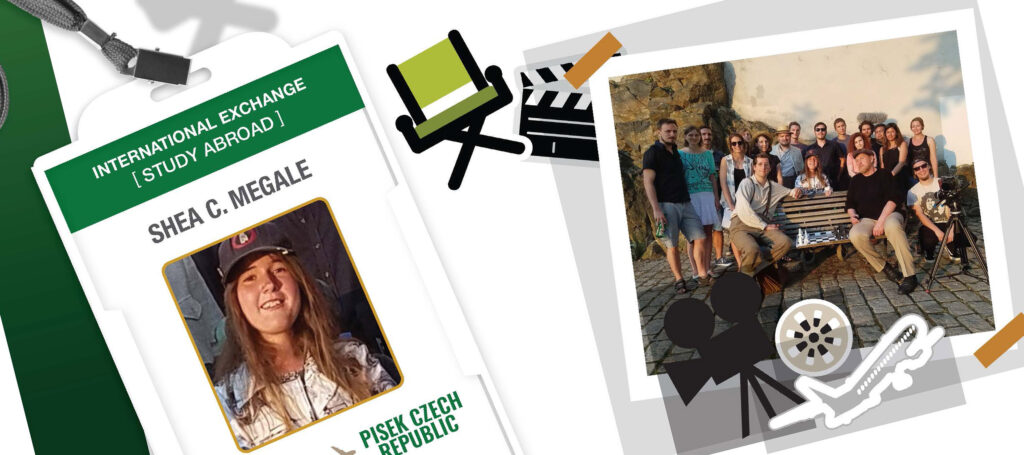In the summer of 2018, Shea Megale, a woman with spinal muscular atrophy type II who uses a power chair, participated in the first-ever Czech Republic filmmaking program organized by Northern Virginia Community College (NOVA).
Students from NOVA flew to Prague, then traveled south to the town of Pisek, where they were mentored by acclaimed Czech filmmakers at the Film Academy of Miroslav Ondricek and engaged with Czech students to produce short films.
Community college had represented an amazing opportunity for Shea to both grow as a person and to find a community of friends her age. She took two years of film classes, and collaborated on film projects with fellow students. All the while she was aware of a potential opportunity to participate in a filming exchange in the Czech Republic, as talk around the film department of inaugurating such a program went back to her first semester at NOVA.
“That feeling of belonging was sacred to me. So the idea of going to Europe to experience challenge, adventure, and discovery with people I loved was a life opportunity I lunged for.”
A panel of professors met to decide which of ten original film scripts from the NOVA students would be converted into movies during the student’s time in the Czech Republic. Shea’s script was one of those chosen, with Shea as the director.
The town of Pisek was the perfect place for a short film project, offering opportunities for a historical old world backdrop that would never be found in the United States. With its classic architecture and cobblestone streets, it was the perfect place for Shea’s script which was based in 1908.
Directing her own film script, Shea practiced leadership and interpersonal skills as she worked with a diverse cast of American and Czech students and actors. Since they could not speak each other’s language, she communicated with her movie cast partially with the help of translators. Her years of practicing different kinds of nonverbal communication also proved useful as she surmounted language barriers to achieve the perfect scenes, such as one in which a character is unexpectedly hit in the face by a flying fish.
“So for one take, I, without speaking through a translator, leapt in front of the actor and used two fingers to say, ‘Keep your eyes right here on me,’ and smiled. He made eye contact with me as we rolled and the fish came and–perfect–he did not flinch. When we finally got the take, he smiled too. No words needed.”
Shea was able to pay for the program and most of the cost of her personal attendant services using the money that she had earned as a teaching assistant for lower-level film classes taught by her favorite professor.
Shea also would require a personal attendant to help get in and out of bed. Shea and her parents did a lot of work to make sure to find the right person. Host staff in the Czech Republic helped find someone by publishing the request in local newspapers.
Shea and her parents ultimately settled on a personal attendant, who was a middle-aged woman that worked for a local eldercare home. Since the personal attendant already had a day job, she had experience, and more than that, she was genuinely interested in learning about Shea and supporting her with her needs.
The personal attendant supported Shea during the mornings and the evenings with her bedtime and wake up routines. Since neither spoke the other’s language, they communicated using a mix of Google translate and nonverbal gestures.
Nevertheless there were times when Shea’s personal attendant was not available due to her other work obligations. For instance, Shea’s personal attendant had to be off to work by six in the morning. At the same time, Shea would sometimes be up until four in the morning filming, and she would come back home more ready to go to bed than to wake up. Fortunately, all it took was a simple group text and she could reliably count on her classmates to assist. In one impactful instance, four male students responded to one of these group texts to transfer Shea from her bed to her chair.
Shea feels fortunate to have been able to access such a special opportunity. As a young, effervescent wheelchair-user passionate about the writing and filming worlds, she needed a college that was moving as fast as she was, and she found that in NOVA. Where else would she have been able to write and direct her own film, leading a cast of 20 Czech students, only in the nimble, supportive environment of the community college?
“Probably my favorite memory was communicating with an older Czech actor I had been working with who spoke absolutely no English. After we wrapped our set at 1 or 2 a.m. I asked him for a hug. The interpreter almost hesitated to translate my request, but when he did, the actor just dove right in.”
Shea plans to graduate with her BA in History with a minor in Astronomy from the University of Virginia. She has also published through St. Martin’s Press her first Young Adult novel about a wheelchair-using film student who falls in love with her lead actor. The book is titled “This is Not a Love Scene.”
This article is part of the AWAY Journal – Community College Issue.

